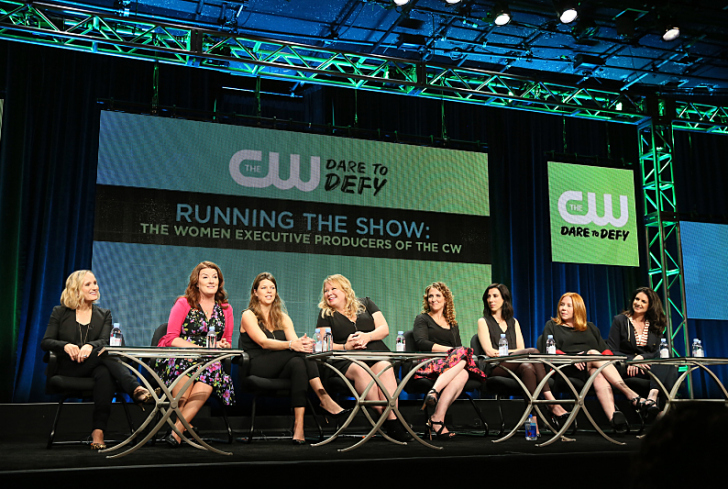The CW’s Female Executive Producers Talk Telling Women’s Stories

👏 “Female voices and female stories are welcomed enthusiastically” at The CW 👏 http://t.co/miQJ8iAouv via @flavorwire
— Femsplain (@femsplain) August 12, 2015
The CW’s session at the Television Critics Association summer tour earlier this week gives us so much reason to hope. After their main presentation, where they debuted their upcoming show from Aline Brosh McKenna called Crazy Ex-Girlfriend, eight female executive producers from The CW took to the stage in a panel called Running the Show: The Women Executive Producers of The CW and spoke honestly and optimistically about being women in the television industry and what they’re doing to help other women thrive in the business.
In addition to Brosh McKenna, the panel included Jennie Snyder Urman (Jane the Virgin), Gabrielle Stanton (The Flash), Diane Ruggiero-Wright (iZombie), Wendy Mericle (Arrow), Julie Plec (The Vampire Diaries, The Originals), Caroline Dries (The Vampire Diaries), and Laurie McCarthy (Reign). They all discussed the fact that The CW is a particularly welcoming place for female writers, and McCarthy mentioned that “I feel like [The CW executives] treat us like we’re showrunners. They don’t treat us like we’re female showrunners.”
Ruggiero-Wright on her responsibility as an executive producer:
I think hiring more female writers is something you have more of a say about. You want to hire the best writer for the job. So if the best writer for a particular job is a man, I’m going to want to hire a man. If the best [person for the] job is a woman, I’m going to want hire the woman. And if it’s between the two, honestly, I’m going to pick the woman, and that’s just the truth. That’s how it’s going to be. If they are equal to the job and I have a choice between a man or a woman, right now in this job, I’m going to support the sisterhood.
Plec discussed the types of storylines she will or won’t tackle on a show:
I used to have this rule. Never make anyone an alcoholic, never make them rape, never make them molested. Because when all is said and done, their character becomes singularly about being that and you lose the ability to write them as human beings without that problem weighing over them.
Ruggiero-Wright explained that sometimes writers don’t have the choice to write what they’d prefer to write:
Sometimes you’re on other staffs of other shows or you’re not the showrunner and you have to do a rape storyline and you don’t want to do it. People are going to be watching it and they’re going to see your name on the episode and they’re going to think you think that’s what it means. Like, this is your interpretation of what it feels like to be a female and suffer this — and it’s not. It’s your own staff of the show, and this is what you kind of have to write, and it’s just such a horrible position to be in as a writer, and I don’t want to put any other writer in that position.
Check out some more great quotes from the panel over at Flavorwire, and rest easy with the knowledge that there are female showrunners and executive producers out there working to make television a better medium for everyone.
—Please make note of The Mary Sue’s general comment policy.—
Do you follow The Mary Sue on Twitter, Facebook, Tumblr, Pinterest, & Google +?
Have a tip we should know? tips@themarysue.com